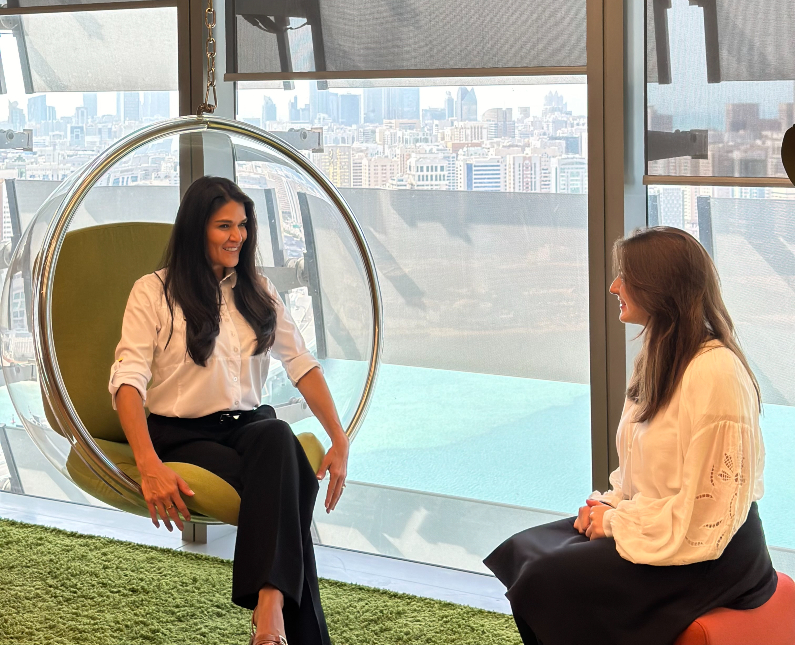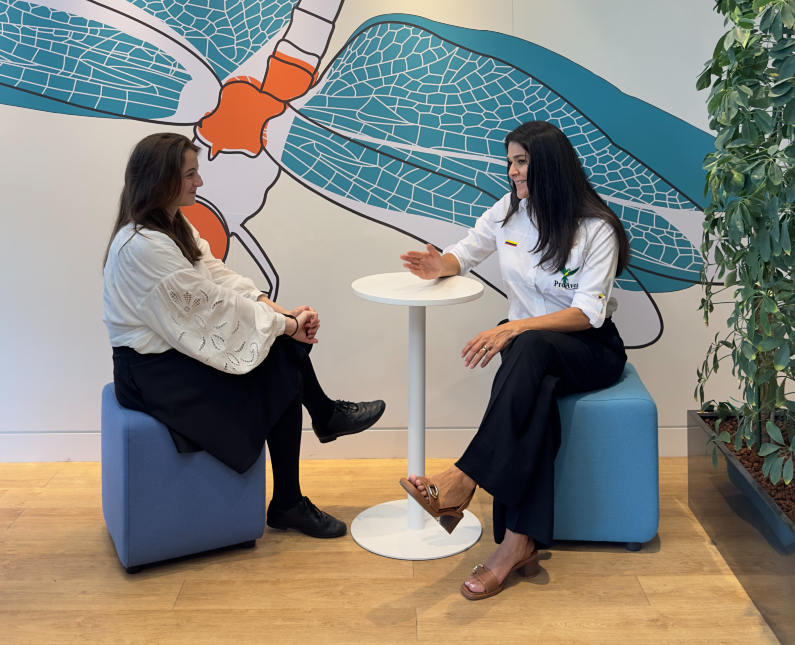Jasmine Sarbo is a student at the German International School Abu Dhabi, with a keen interest in environment, wildlife, and nature. She aims to study in that field after completing her tertiary education and aims to positively impact the environmental crisis and help endangered animals. Jasmine recently did an internship at the Mohamed bin Zayed Species Conservation Fund. It was here where she had the privilege of meeting and interviewing one of the MBZF conservation partners, Sara Lara, Executive Director of Fundación ProAves.
Jasmine Sarbo: I am here with renowned species conservationist, women’s empowerment advocate and the founder of Fundación ProAves and Women for Conservation, Sara Ines Lara.
Jasmine Sarbo: I am absolutely thrilled to be able to speak with you. Please tell me about you.
Sara Lara: Of Course! So nice to meet you as well. My name is Sara Ines Lara and I absolutely love nature. I grew up in the south of Colombia, in a rural area, where everything is surrounded by trees and animals. I wasn’t the most secure person growing up and together with many other problems, I was very unhappy and unconfident. Nature helped me when I needed it desperately, it acted like therapy and healing, it molded me into the person I am today. I am an incredibly passionate person in both aspects of my work. I hope to inspire younger girls to also unlock their potential, whilst teaching them about the importance of the environment.
JS: Thank you so much for sharing this with us! Could you describe the process of founding ProAves, what did the very beginning look like?
SL: I had a job, quite a stable one as well, but I decided to quit. I couldn’t help this nagging feeling that I was going to regret not even trying to do what I had dreamed of doing and I hate that feeling of “What if?”. As soon as I quit, I felt free; I started signing up for volunteer work every chance I had, and that is when I discovered the Yellow Ear Parrot. The bird was very endangered, but so beautiful. This volunteer work stirred an emotion inside me and that’s why I used the yellow ear parrot as the logo for my company. My passion for nature and justice for these animals only grew from there. Whilst volunteering, I started noticing that there were almost no women in this area, other than some biologists and ecologists. I worked my way up the ladder and strived to incorporate women in volunteering. Some men were unhappy with a woman being in a leading position, which started a few conflicts. Eventually more women joined, and more men left. This “foundation” had now become a safe space for women, to talk about their woes and problems, a place they severely needed. It was more than defending our species, we had built real connections and bonds between us. Soon enough we gave this foundation a proper name and that’s how it started.
JS: What an inspiring story. Speaking of inspiring, you had mentioned before that another goal of this foundation is to inspire young girls to reach higher goals, especially in these rural areas. You definitely achieved that after being featured in the book “100 great Latin American women.” How did you feel when receiving this title and what effect do you think it had?
SL: Yes, that was very exciting! Although doing my work is very fulfilling, it always feels good when your actions get recognized and appreciated. Here especially, one of the most meaningful experiences in my work is when the women bring their kids and young daughters to learn about the environment. I have been in this field for more than two decades and it is so heart-warming to watch the children you taught, grow up into independent adults and come to you, with maturity in their eyes, and tell you how you influenced and inspired them to pursue a career in biology or just in general, gave them confidence.
JS: That must be such an enlightening experience! Also, how did you come across the Mohamed bin Zayed Species Conservation Fund when your work was focused on South America?
SL: This particular area of work is not the largest and so, the biggest funding organizations are already known. The Mohamed bin Zayed Species Conservation Fund is international and funds projects everywhere. They have an incredible reputation and have been an absolute necessity for our projects.
JS: How do they fit in with your projects?
SL: They obviously provide us with financial support, but you also feel they care for the animals or the situation in other countries. There are many funding foundations, but not many share the same passion and love for nature as the people doing the practical work: this is something the Mohamed bin Zayed Species Conservation Fund has and that spoke to me whilst searching for funding. They involve themselves and have even visited us in Colombia.
JS: And do you have any long-term goals for your foundation?
SL: Yes. We can protect and preserve our 3 main project sites as much as possible in our lifetime, but to really seal the deal we’ll have to get government approval. That’s one of our main objectives: to get a stamp on a legal document that will protect these areas for the future. We’ve already received approval for 2 sites, which was a huge accomplishment, and I was overjoyed when I heard the news. Now we are hoping for the last one to get authorized. It was definitely an uphill battle, and I must thank Mohamed bin Zayed Species Conservation Fund for our success, as having such a reputable name stand behind us in our goals, contributed to the authorization of our nature reserves.
JS: That’s fantastic! I hope the last one gets approved as well. You mentioned previously that you felt that women and nature have a special bond. Why do you feel this way and why do feel that men lack this connection?
SL: Well, I respect and love men, I have a husband and a son, but no matter how hard they try or how a woman tries to describe it, you cannot express how it feels to grow a human inside of you. To feel the heartbeat of your baby and to feel it move and kick, these moments connect us with nature. Nature is birth, nature is life and nature is growth. Nature gave birth to us and all the other wonderful things around us and men will not be able to understand this inner sentiment and love towards nature from a woman’s perspective. That is what our bodies were built for and that is also what mother nature was built for, we connect on a deeper level. That is at least how I feel.
JS: Thank you for that lovely perspective. With such experience and wisdom, I find it hard to believe that you will ever retire. Have you already made thoughts about it or are you planning something?
SL: Well, I’m actually not the leading Director of this foundation anymore, my daughter is. Of course, I am still heavily involved in the decision making and all sorts of things but it’s my daughter who has taken over. She recently got her masters in environment and I’m so proud and happy for her. I think I will never really retire, my heart and soul belong to my work and family, and I will be doing this for the rest of my life. My passion will never go away, I will always find my way back to nature and to my home.
JS: Thank you so very much for your time today, it was wonderful and inspiring to speak with you.
SL: Thank you for interviewing me, it was a pleasure.



